In the United States, a registered nurse certified in maternal newborn nursing (RNC-MNN) is a obstetrical nurse who has earned a nursing board certification from the National Certification Corporation in maternal/newborn nursing.
In the United States, a registered nurse certified in maternal newborn nursing (RNC-MNN) is a obstetrical nurse who has earned a nursing board certification from the National Certification Corporation in maternal/newborn nursing.
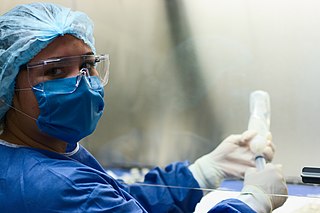
An oncology nurse is a specialized nurse who cares for cancer patients. These nurses require advanced certifications and clinical experiences in oncology further than the typical baccalaureate nursing program provides. Oncology nursing care can be defined as meeting the various needs of oncology patients during the time of their disease including appropriate screenings and other preventive practices, symptom management, care to retain as much normal functioning as possible, and supportive measures upon end of life.
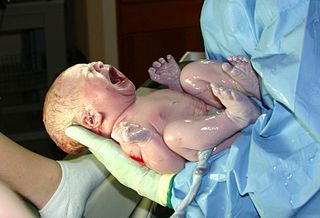
Neonatology is a subspecialty of pediatrics that consists of the medical care of newborn infants, especially the ill or premature newborn. It is a hospital-based specialty, and is usually practised in neonatal intensive care units (NICUs). The principal patients of neonatologists are newborn infants who are ill or require special medical care due to prematurity, low birth weight, intrauterine growth restriction, congenital malformations, sepsis, pulmonary hypoplasia or birth asphyxia.

A neonatal intensive care unit (NICU), also known as an intensive care nursery (ICN), is an intensive care unit (ICU) specializing in the care of ill or premature newborn infants. Neonatal refers to the first 28 days of life. Neonatal care, as known as specialized nurseries or intensive care, has been around since the 1960s.
Pediatric nursing is part of the nursing profession, specifically revolving around the care of neonates and children up to adolescence. The word, pediatrics, comes from the Greek words 'paedia' (child) and 'iatrike' (physician). 'Paediatrics' is the British/Australian spelling, while 'pediatrics' is the American spelling.
Nursing credentials and certifications are the various credentials and certifications that a person must have to practice nursing legally. Nurses' postnominal letters reflect their credentials—that is, their achievements in nursing education, licensure, certification, and fellowship. The letters usually appear in the following order:
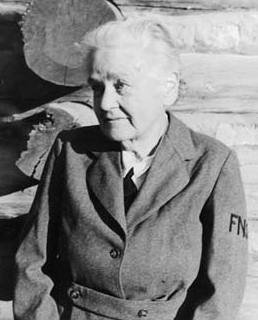
Mary Carson Breckinridge was an American nurse midwife and the founder of the Frontier Nursing Service (FNS), which provided comprehensive family medical care to the mountain people of rural Kentucky. FNS served remote and impoverished areas off the road and rail system but accessible by horseback. She modeled her services on European practices and sought to professionalize American nurse-midwives to practice autonomously in homes and decentralized clinics. Although Breckinridge's work demonstrated efficacy by dramatically reducing infant and maternal mortality in Appalachia, at a comparatively low cost, her model of nurse-midwifery never took root in the United States.

Georgetown UniversitySchool of Nursing & Health Studies (NHS) is one of the five undergraduate schools of Georgetown University. Founded in 1903 as the School of Nursing, it added three other health related majors in 1999 and appended its name to become the School of Nursing & Health Studies. The school has been at the forefront of education in the health care field, offering many programs unique to America's elite institutions. Offering undergraduate and graduate programs in the health sciences, graduates are prepared to enter the complex fields of medicine, law, health policy, and nursing. NHS is made up of the Department of Health Systems Administration, the Department of Human Science, the Department of International Health, and the Department of Nursing.

Neonatal nursing is a sub-specialty of nursing care for newborn infants up to 28 days after birth. The term neonatal comes from neo, "new", and natal, "pertaining to birth or origin". Neonatal nursing requires a high degree of skill, dedication and emotional strength as they care for newborn infants with a range of problems. These problems vary between prematurity, birth defects, infection, cardiac malformations and surgical issues. Neonatal nurses are a vital part of the neonatal care team and are required to know basic newborn resuscitation, be able to control the newborn's temperature and know how to initiate cardiopulmonary and pulse oximetry monitoring. Most neonatal nurses care for infants from the time of birth until they are discharged from the hospital.
The American Nurses Credentialing Center (ANCC), a subsidiary of the American Nurses Association (ANA), is a certification body for nursing board certification and the largest certification body for advanced practice registered nurses in the United States, as of 2011 certifying over 75,000 APRNs, including nurse practitioners and clinical nurse specialists.
Health professional requisites refer to the regulations used by countries to control the quality of health workers practicing in their jurisdictions and to control the size of the health labour market. They include licensure, certification and proof of minimum training for regulated health professions.
Obstetrical nursing, also called perinatal nursing, is a nursing specialty that works with patients who are attempting to become pregnant, are currently pregnant, or have recently delivered. Obstetrical nurses help provide prenatal care and testing, care of patients experiencing pregnancy complications, care during labor and delivery, and care of patients following delivery. Obstetrical nurses work closely with obstetricians, midwives, and nurse practitioners. They also provide supervision of patient care technicians and surgical technologists.
In the United States, a registered nurse certified in neonatal intensive care (RNC-NIC) is a neonatal intensive care nurse who has earned nursing board certification. The certification is established by an exam that is one of the core certification exams offered by the National Certification Corporation (NCC).
The National Certification Corporation (NCC) was established for the development, administration, and evaluation of a program for certification in obstetric, gynecologic and neo-natal nursing specialties in the United States. Incorporated in 1975 and governed by a board of directors, NCC's certification program is accredited by the National Commission for Certifying Agencies (NCCA), the accreditation body of the Institute for Credentialing Excellence. By 2009, NCC had awarded over 95,000 certifications and certificates of added qualification.
Certified in Neonatal Pediatric Transport (C-NPT) is the designation in the USA for a paramedic, physician, respiratory therapist, neonatal nurse, nurse practitioner, nurse or physician assistant who has earned certification from the National Certification Corporation in neonatal and pediatric transport. This certificate of added qualification was rolled out in 2009. National Certification Corporation utilizes applied measurement professionals to administer its tests.
Women's Health Care Nurse Practitioner-Board Certified (WHNP-BC) is the designation for a women's health nurse practitioner who has earned nursing board certification from the National Certification Corporation.
In the United States, certified nurse midwives (CNMs) are advanced practice registered nurses in nurse midwifery, the nursing care of women during pregnancy and the postpartum period. CNMs are considered as midwives.
A women's health nurse practitioner (WHNP) is a nurse practitioner that specializes in continuing and comprehensive healthcare for women across the lifespan with emphasis on conditions unique to women from menarche through the remainder of their life cycle.
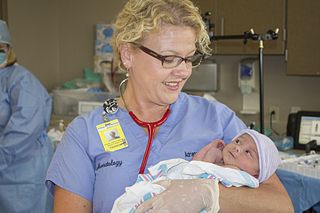
A neonatal nurse practitioner (NNP) is an advanced practice registered nurse (APRN) with at least 2 years experience as a bedside registered nurse in a Level III NICU, who is prepared to practice across the continuum, providing primary, acute, chronic, and critical care to neonates, infants, and toddlers through age 2. Primarily working in neonatal intensive care unit (NICU) settings, NNPs select and perform clinically indicated advanced diagnostic and therapeutic invasive procedures. In the United States, a board certified neonatal nurse practitioner (NNP-BC) is an APRN who has acquired Graduate education at the master’s or doctoral level and has a board certification in neonatology. The National Association of Neonatal Nurse Practitioners (NANNP) is the national association that represents neonatal nurse practitioners in the United States. Certification is governed by the National Certification Corporation for Obstetrics, Gynecologic and Neonatal Nursing Specialties (NCC).
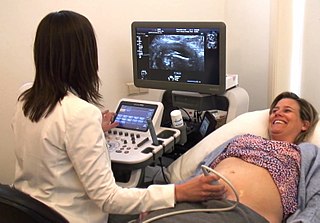
A midwife is a health professional who cares for mothers and newborns around childbirth, a specialization known as midwifery.